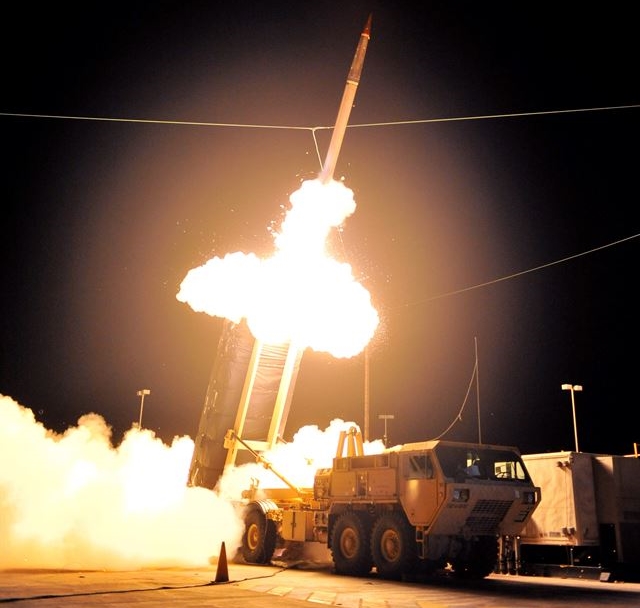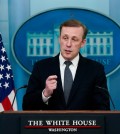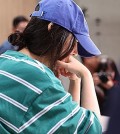- California Assembly OKs highest minimum wage in nation
- S. Korea unveils first graphic cigarette warnings
- US joins with South Korea, Japan in bid to deter North Korea
- LPGA golfer Chun In-gee finally back in action
- S. Korea won’t be top seed in final World Cup qualification round
- US men’s soccer misses 2nd straight Olympics
- US back on track in qualifying with 4-0 win over Guatemala
- High-intensity workout injuries spawn cottage industry
- CDC expands range of Zika mosquitoes into parts of Northeast
- Who knew? ‘The Walking Dead’ is helping families connect
Seoul pressures China with THAAD
By Jun Ji-hye
South Korea’s changing stance on the THAAD missile defense system reflects growing worries here about China’s two-faced approach toward North Korea and its nuclear program, analysts said Tuesday.
President Park Geun-hye and key defense officials have indicated that Seoul can allow the U.S. to deploy the Terminal High-Altitude Area Defense (THAAD) system that can detect and destroy North Korean missiles loaded with nuclear warheads, since the Northfourth nuclear test conducted on Jan. 6.
Their comments triggered speculation that Seoul is leaning toward the deployment of the missile defense system because China is refraining from joining international efforts to toughen sanctions against the North.
Korean officials had until recently been reluctant in expressing opinions about THAAD, only sticking to the stance of the so-called “three Nos,” which means there has been no request from the U.S., no negotiations with the U.S. and no decision made about it.
That was largely because of China.
However, the Korean government, by hinting at THAAD deployment, is apparently trying to add pressure on Beijing to play a much-needed role in discouraging the repressive state’s nuclear ambitions. Experts say that the government is well aware that Beijing is strongly opposed to having THAAD on Korean soil, out of concerns that its radar system could snoop on Beijing’s military activities and missile capabilities.
Kang Jun-young, a professor of political science at Hankuk University of Foreign Studies, said the government apparently intends to deliver a message to China that it should swiftly rein in Pyongyang’s nuclear ambitions if it does not want THAAD to be deployed on the peninsula.
“China is very concerned about the deployment of THAAD as well as U.S. strategic assets here as China itself could be included in THAAD’s operational radius,” he said during a radio appearance. “The government’s open debate on THAAD will surely play a role in sending a message to China, such as, ‘Six-party talks have failed to resolve the North’s nuclear issue, and that is why THAAD deployment is being discussed now. If China doesn’t want such deployment, it should actively come forward to resolve the issue.’”
Beijing, traditionally an ally of the North, has been largely seen as maintaining a lukewarm stance on Pyongyang’s nuclear development, although South Korea and the U.S. keep stressing its role. This has raised speculation that China, a veto-holding permanent member of the United Nations Security Council, is seeking to water down the U.N.-led sanctions — in a familiar pattern — following the North’s previous nuclear and long-range missile tests.
After the North’s nuclear test, President Park as well as Defense Minister Han Min-koo openly cited the need for the nation to review THAAD deployment on Jan. 13 and again Jan. 25. Their remarks followed U.S. politicians and experts’ emphasis on the necessity of deploying missile defense systems in South Korea.
For the proponents of THAAD deployment, the North’s fourth nuclear test is a good excuse to persuade those who are opposed to the deployment. The latter cast doubts on its effectiveness and the burden of its high cost, as well as being concerned of worsening relations with China, analysts said.
“The latest remarks of the government apparently show that its position about THAAD deployment has changed,” said Kim Dae-young, a senior research fellow at the Korea Defense and Security Forum. “Reflecting the recent mood of mounting threats from the North following its claimed H-bomb test, the government seems to be making the move in earnest toward THAAD deployment.”

















freeplaycheats.com
March 6, 2017 at 4:01 AM
If you want to get the sims free play cheats and unlimited money without paying anything from here. You can get sims free play hack which provides you resources of sims free play game like unlimited LP and free simoleons completely free…!!!!